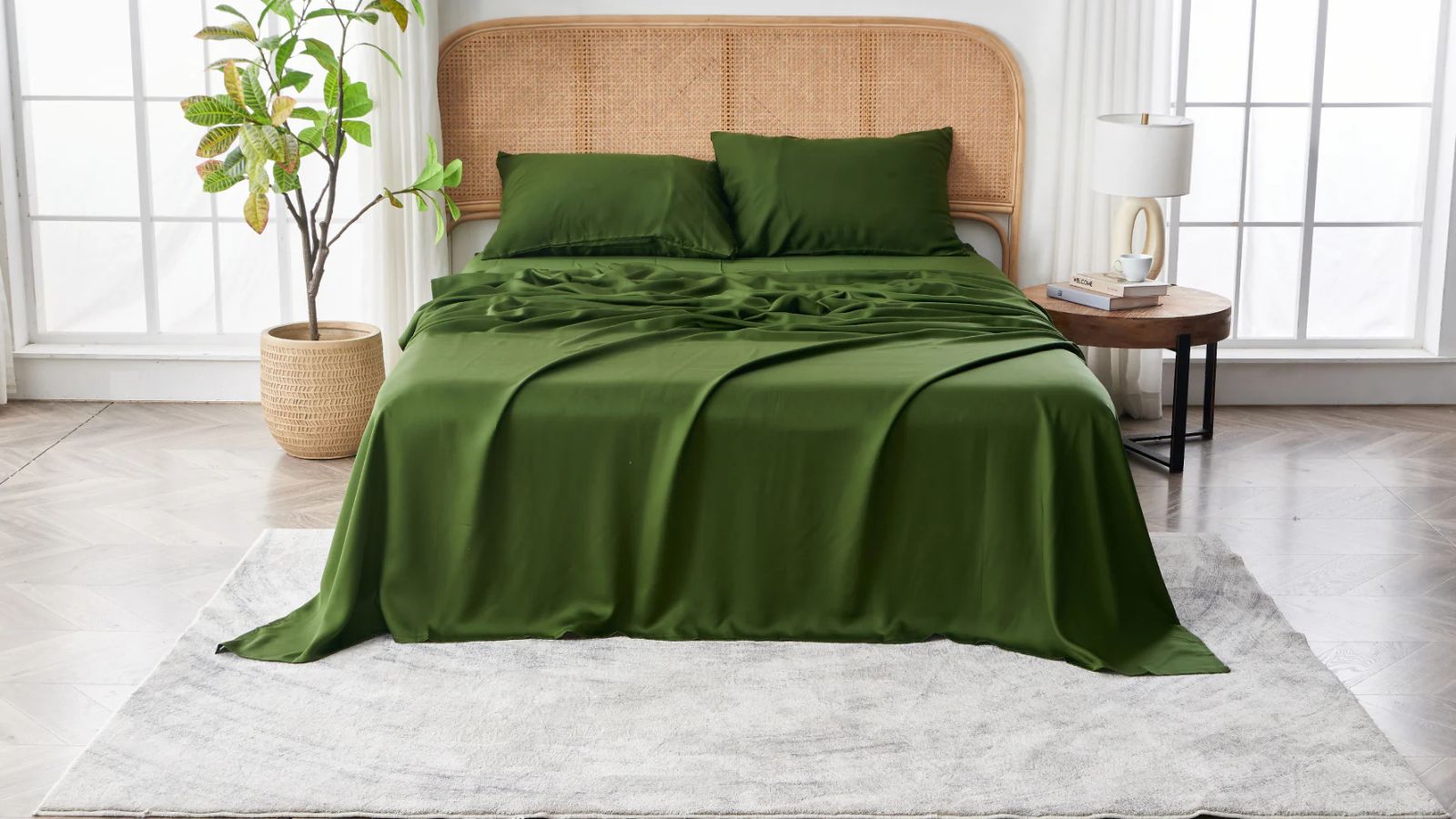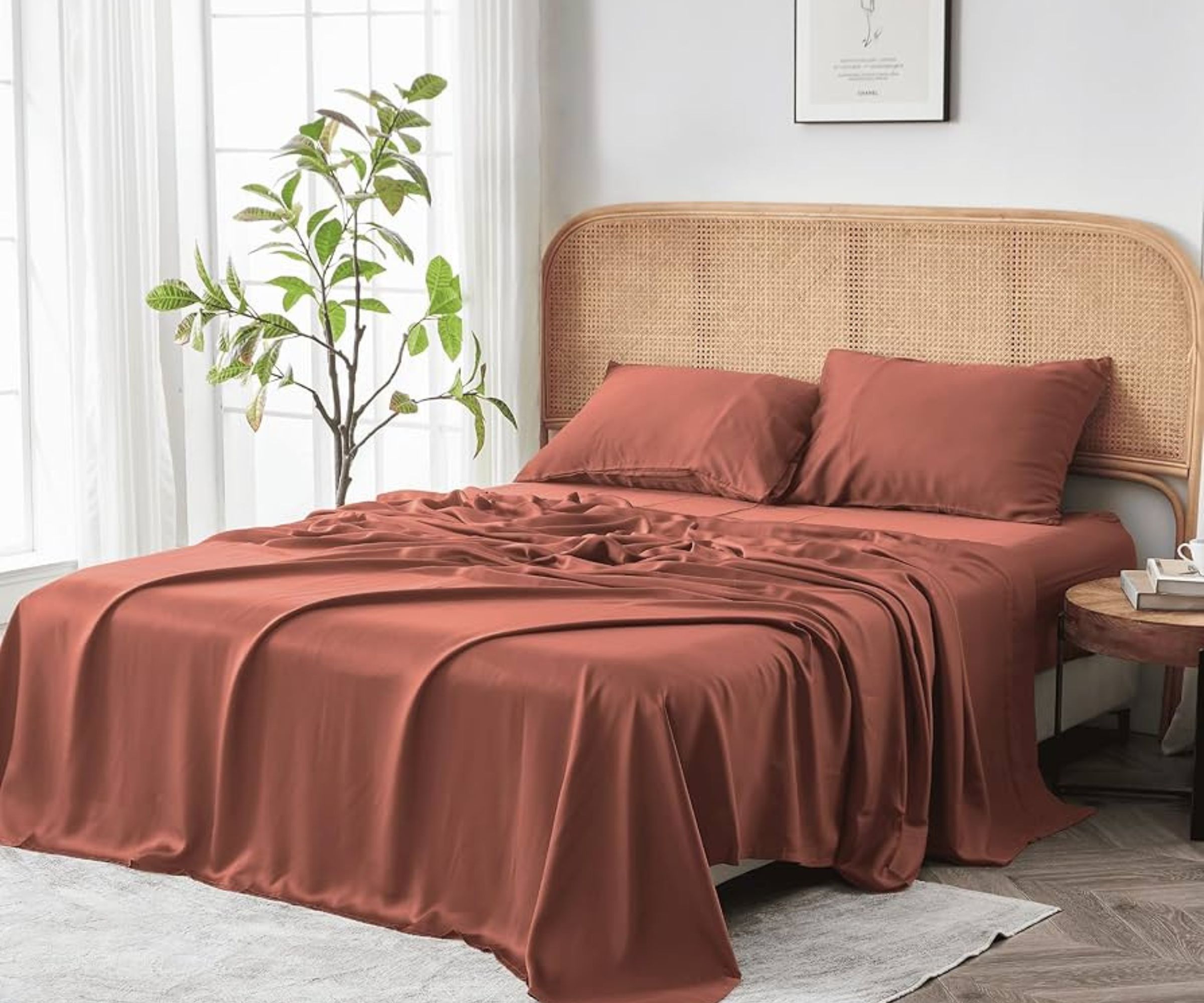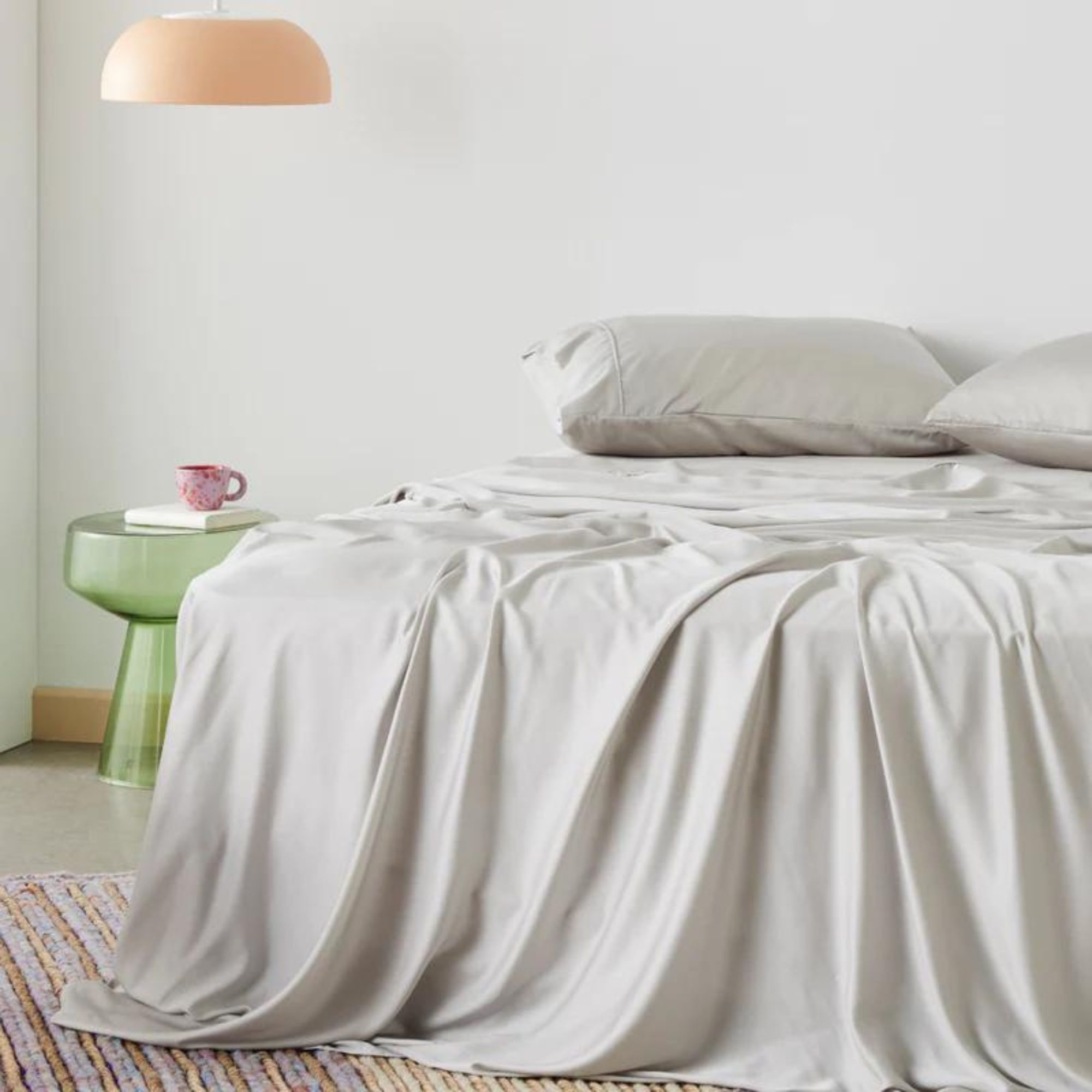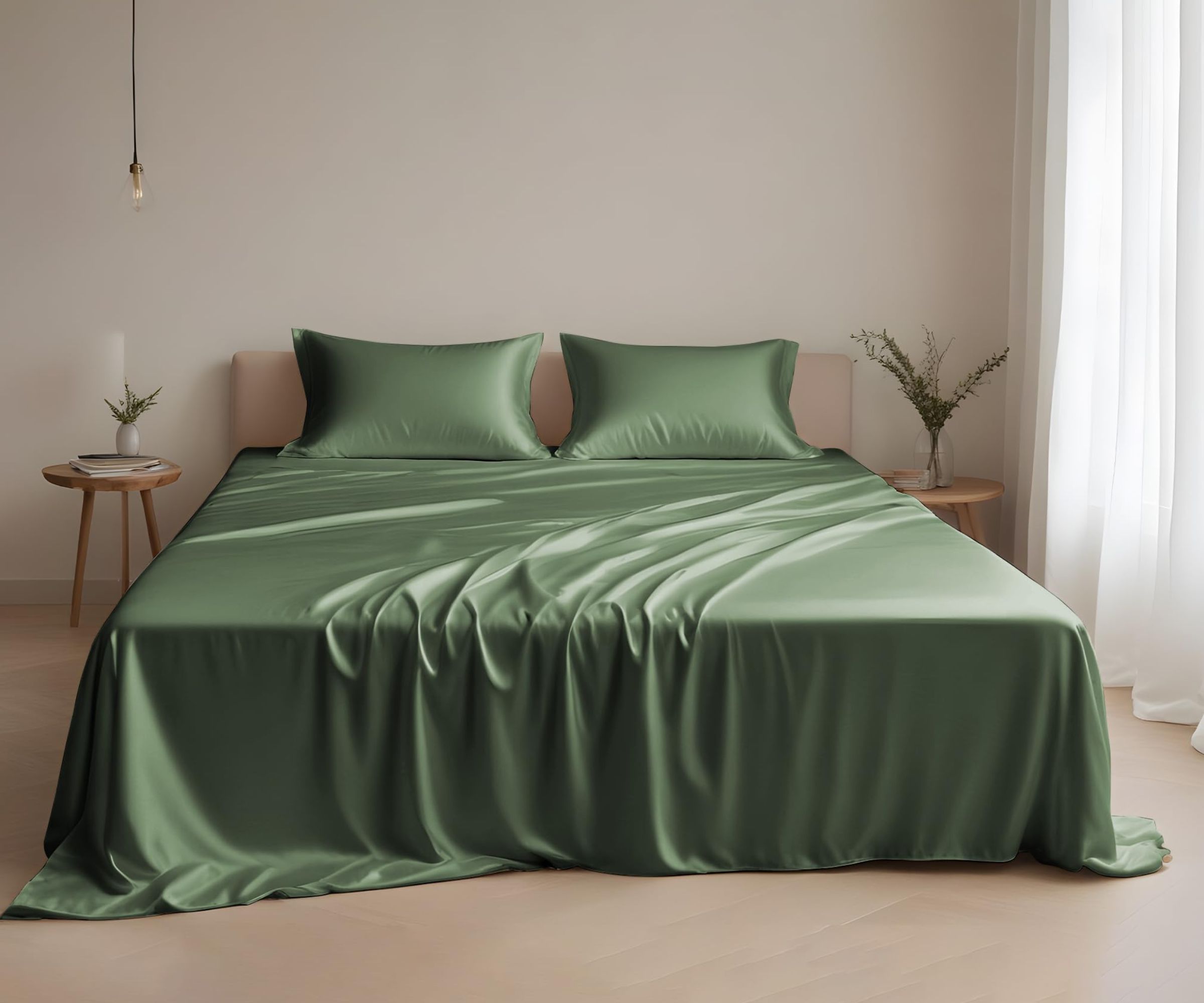
If you've ever tried shopping for sheets, whether in-store or online, you might have come across the term 'Tencel'. Perhaps you've scrolled past the word 'Tencel' as part of a product listing or read it printed on a care tag without fully understanding what it means.
In short, Tencel is a semi-synthetic material made from sustainably sourced eucalyptus wood pulp. Tencel is used in bed sheets for the same reasons that it's used in athleisure and activewear − because it's breathable, thermoregulating, and moisture-wicking. That's why Tencel is such a good option for hot sleepers.
As H&G's resident Sleep Editor, I lead a team of expert testers in the search to find the world's best bed sheets. Together, we've tested everything from crisp cotton percale to sumptuous bamboo sateen, including several Tencel sets. I consulted bedding designers to learn more about the pros and cons of Tencel and we want to share our hard-won wisdom with you.
What is Tencel? Your expert guide
If you're shopping for sheets, then you're in luck. I've spent hours scouring the sites of the best places to buy bedding to find the best Tencel sheet money can buy. For the sake of a fair fight, we assess each sheet set against the same criteria: look and feel; thermoregulation; and durability.
What is Tencel?

Tencel is not the name of a fiber, but a brand name or trademark for lyocell fibers. Anni Stromfeld, co-founder of sustainable bedding brand Sijo, explains that 'eucalyptus wood pulp is the primary component in the creation of lyocell, also known as Tencel.'
'Essentially, Tencel is a type of rayon, like viscose or modal,' adds Amanda Turner, Vice President of Product & Innovation at eco bedding brand ettitude. Rayon is a catch-all term for semi-synthetic fabrics made from regenerated cellulose that feel soft and silky against your skin.
Rayon often gets a bad rap for using toxic chemicals to treat the cellulose, but Anni says that 'the lyocell creation process is considerably more sustainable than viscose or modal. Making lyocell involves organic solvents and a closed-loop process to take the wood pulp and create fibers, which reduces solvent and water waste.'
Sizes: Twin, twin XL, full, queen, king, California king
Material: 100% Tencel Eucalyptus
Colors: 7
OEKO-TEK certified: Yes
+ Cold to the touch
+ Great price
- Prone to wrinkling
These are some of the best cooling bed sheets on the market. High in quality, great in price, moisture-wicking and anti-microbial, they're the best bed sheets for hot sleepers who want to shop sustainably. They crease more than their bamboo counterparts but offer much cooler sleep thanks to an open weave and lightweight feel.

Sizes: Twin, twin XL, full, queen, king, California king
Material: Bamboo lyocell
Colors: 12
OEKO-TEK certified: Yes
+ Naturally cool to the touch
+ Stylish sateen finish
- Silky look isn't for everyone
This bed sheet set from ettitude isn't made from eucalyptus lyocell but rather bamboo. With similar smooth-to-the-touch properties and an ability to keep your temperature regulated, ettitude's sheets kept me cool and comfortable all night long. They have a slightly silkier appearance thanks to the sateen sheen, and look beautiful dressed on the bed.
Sizes: Twin, twin XL, full, queen, king, California king
Material: 100% eucalyptus lyocell
Colors: 12
OEKO-TEK certified: No
+ Affordable
+ Super soft and silky
- Not as cooling as others
These affordable Tencel sheets from Linenwalas offer better sleep on a budget. Pure eucalyptus lyocell bedding can be expensive, but these bestsellers prove you don't have to overspend to enjoy the benefits of Tencel. I'm yet to try these myself but with over 1000 great reviews complimenting their quality, color, and comfort, I wouldn't be afraid to recommend these sheets. Many customers even say they wash well with little pilling, which is impressive for bedding you can buy from Amazon.
What are the pros and cons of sleeping on Tencel?

According to Amanda, 'Tencel requires less energy and water to make than conventional cotton, and manufacturing is closed-loop, promoting the reuse and recycling of materials.' That's good news for eco-conscious shoppers.
Whether you suffer from night sweats or hot flashes or you tend to run a little warm, you'll appreciate the cooling properties of Tencel. Much like bamboo, eucalyptus is naturally moisture-wicking and antimicrobial to kill the bacteria that breed in hot, damp environments, such as beds. In my experience, Tencel sheets feel truly cold to the touch, much more so than cotton percale or even bamboo. I slept on my Sijo sheet set through a heatwave: it was the only thing that could keep me cool.
Tencel feels silky and smooth, just the thing to create a dramatic drape over your bed. Still, if you like your bed sheets to have a little more texture, you might prefer a set of the best linen sheets. Linen has similar antimicrobial and moisture-wicking properties as Tencel, but it doesn't feel slippery in the same way.
FAQs
Is Tencel natural or synthetic?
Neither. Tencel is the brand name for lyocell, which is a semi-synthetic fiber. Found in nature and sustainably sourced from eucalyptus wood, Tencel is produced using a closed-loop manufacturing process, which promotes reuse and recycling. What makes Tencel semi-synthetic is the dyeing process, which sometimes incorporates chemicals not found in nature.
Is Tencel as breathable as cotton?
In my experience, Tencel sleeps cooler than cotton. Derived from eucalyptus, Tencel is naturally moisture-wicking and antimicrobial to bust the bacteria that breed in sweaty, sticky environments, such as beds. Cotton percale can be breathable, too, but it tends to be thicker than Tencel, so it's better suited for all-season use.
If you're keen to shop sustainably, then there are plenty of eco-friendly upgrades you can make to your sleep routine. One of the best organic mattress toppers could transform the look and feel of your mattress: avoid polyurethane foam in favor of natural latex or moisture-wicking wool. If you know you need a new mattress, consider the best organic mattress for natural cooling and non-toxic comfort.







